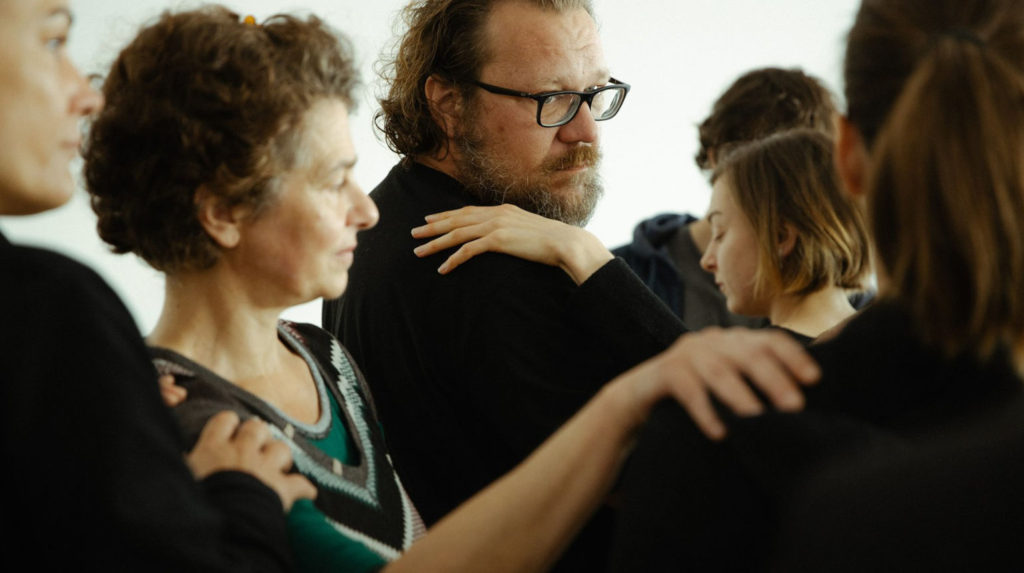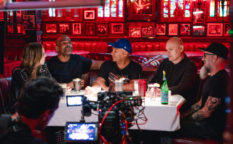Sarajevo review: Pero (2023)
Sarajevo Film Festival
Documentary Competition

Slovenian filmmaker Damjan Kozole might be best known for his work in the field of fiction features (such as the award-winning titles Spare Parts, Arbeit Macht Frei, A Slovenian Girl and Night Life), but he is not shy of other forms. He actually started his career with an experimental-documentary-meta film hybrid and he returned to directing documentaries several times since, usually opting for a portrait genre, with Project: Cancer being the most recognized internationally. In his fiction work, he would often cast his probably favourite actor and friend Peter Musevski, so when he finished his latest fiction feature Half-Sister, he started working on an experimental-documentary-cross-genre project based on Musevski’s life, experiences and roles.
Then, at the beginning of the pandemic, Musevski committed suicide by jumping off the second floor of his summer home at the Croatian island of Krk. Kozole lost his friend, his house actor and his project, but not his film. The project was adapted and shot under the simple title Pero, which is an affectionate nickname for the late actor’s name, but also a symbolic “road sign” pointing to Peter’s “spiritual animal”, most loyal follower and best friend, his hound dog Pingo. Pero premiered earlier this year in Rotterdam, and we caught it at Sarajevo where it screened in the In Focus section.
After the prologue and the epilogue filmed with a cellphone by Musevski himself and, of course, featuring Pingo as the star, Kozole sets his 5-chapter structure, with each “act” working in a different “genre” of documentary and docu-fiction cinema. The first and the longest is the direct documentary filmed at the two-day-four-session psychodrama workshop held by the acclaimed stage director Tomi Janežič, organized by Kozole for Musevski’s colleagues and acting partners from various films. The conversations between the actors and Janežič start with reminiscence of Musevski and the time they shared with him, his signature quotes, his alcoholism that takes the edge off, while the topics of depression and suicide come slowly to light, culminating in “recreating” the act and their best scenario reaction to the situation. The style of it is a bit raw, with multiple cameras and cinematographers occasionally jumping in the frame of one another, and rapid, decisive editing cuts, which actually suit the genre.
The second chapter looks and acts like a part of a fiction movie because it actually kind of is. Kozole and the crew are filming the scene from the abandoned Musevski project, with Primož Pirnat playing Peter Musevski. He is approached by the young, energetic filmmaker Tina Ščavničar with the idea that he should play the notorious serial killer from Yugoslav times, Metod Trobec, in her new film that re-imagines him in the present day Slovenia. She envisioned the film as a “feminist revenge horror”, and a nod to the first Slovenian film directed by a woman, Maja Weiss’ The Guardian of the Frontier. In that segment, we get the confirmation that Musevski went deep into his roles, and that every role of his somehow reprised in his life. When he refuses the role on the very same grounds, she offers another one: that of the filmmaker Lars von Trier based on their physical resemblance. The psychological is never stated, but it is still understood: both the director and the actor suffer(ed) from the depression.

Third part is a pretty conventional, but still very smartly arranged collage of Musevski’s roles in films by Kozole and other Slovenian filmmakers from the actor’s earliest (including the breakthrough in Jan Cvitković’s Bread and Milk) to his final in Vinko Möderndorfer’s Deadlock that premiered one year after his death. First we see him in the silent moments, than his reactions and finally him speaking. In that order, we get to realize Musevski’s type of character, a gentle and kind, but flawed everyman, and why filmmakers would cast him repeatedly (according to the IMDB, he has 55 acting credits to his name, but he certainly has more than that).
The fourth part is a chronicle of the pandemic’s beginning, globally and in Slovenia, and the new right-wing government’s reaction to it, complete with the news of cancellations of the festival screenings for Half-Sister, first balcony and then cycling protests in Slovenia, eerily empty streets of Ljubljana in the evening, as well as the news of Peter’s death, the complications with the cremation of his body in Zagreb that was just hit by the earthquake, retrieving it, scouting the graveyard in order to film the funeral and finally the funeral itself, attended by 11 people. Finally, we get to see Kozole’s own home video of Musevski from 2013, in which the filmmaker and his partner interview the actor who speaks openly about his depression from which he had suffered since childhood, chain-smoking just like his film characters often did.
Pero is an instant classic that serves as an evidence of how hardship can nurture creativity. Kozole showcases his many abilities as a director and brilliant structuring skills that show both his own vulnerability and how he thought greatly of Musevski. The film does not just serve as a bow to the actor, a farewell to a friend, it is not just a film that puts a spotlight on mental illness and humanity’s inability to treat some of the silent killers, a desperate cry for help for another person (that the same person could not make), and a great film about the noble art of acting. It is about all that and more. It actually shows how great, exceptional, one-of-a-kind person and actor Musevski was.
Year: 2023
Runtime: 98’
Country: Slovenia
Languages: Slovenian, Serbo-Croatian
Written/ Directed/ Narrated by: Damjan Kozole
With: Tomi Janežič, Primož Pirnat, Anja Novak, Blaž Setnikar, Pia Zemljič, Jurij Drevenšek, Liza Marijina, Nina Ivanišin, Ina Rakovec, Mojca Partljič,
Marjuta Slamič, Nataša Burger, Nataša Barbara Gračner, Tina Ščavničar, Peter Musevski, Damjan Kozole
Cinematography: Sašo Štih
Additional cinematographers: Damjan Kozole, Zala Opara
Editing: Matic Drakulić
Sound Design: Julij Zornik
Sound Recording: Igor Iskra
Production Design: Neža Zinajić
Costume Design: Zora Stančič, Zala Opara
Make-up: Mojca Gorogranc Petrushevska
Colourist: Jure Teržan
Produced by: Danijel Hočevar, Zala Opara
Production company: Vertigo
Co-production company: RTV Slovenia
Supported by: Slovenian Film Centre, Korektif, 001, Viba Film
















